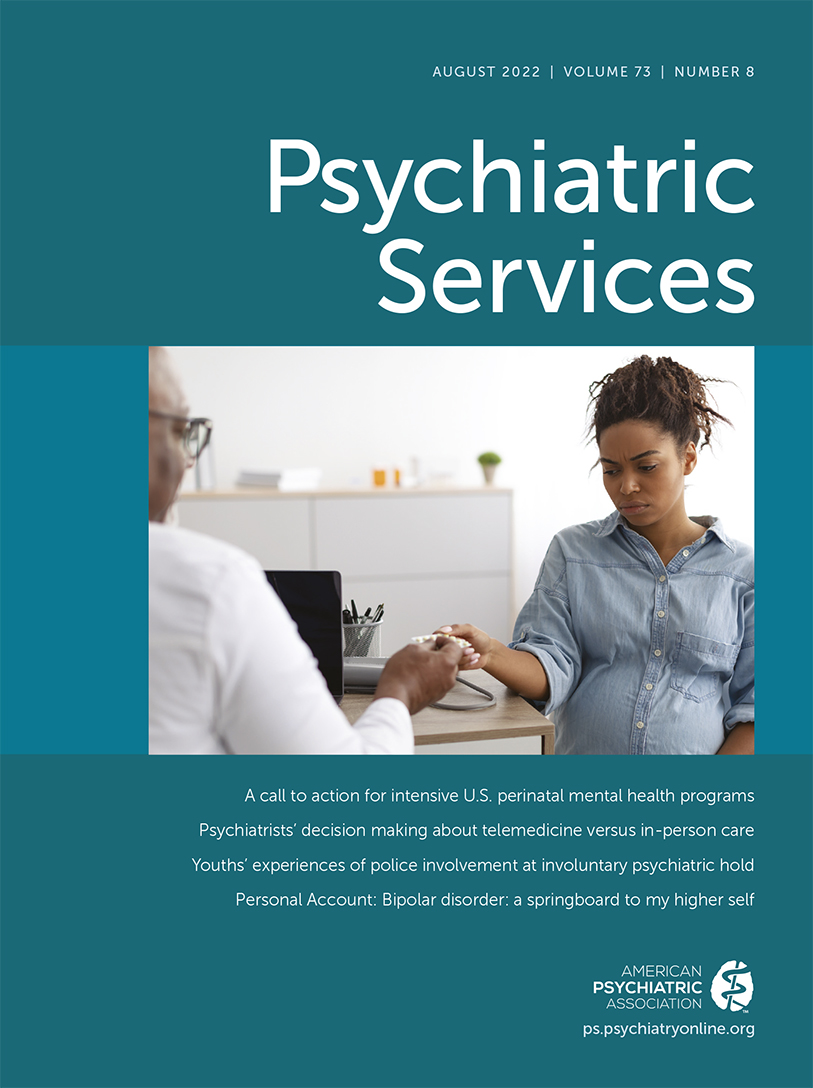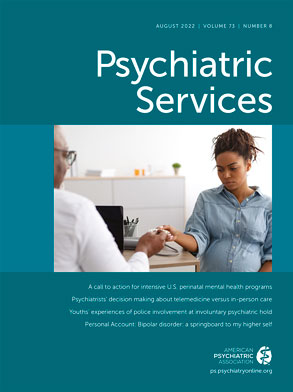I will never forget the helpless look on my parents’ faces. The year was 1996, and it was supposed to be my first semester of freshman year in college. As a large-framed orderly pulled me through the hall of Carrier Clinic’s psychiatric hospital, I screamed “No, no, no, let me go home!” Looking back at my parents, I could see Mom was leaning on Dad’s shoulder, crying as he rubbed her back to console her. I flailed my arms and legs and tried to break free of the orderly’s strong grip. I wrestled with him futilely until heavy doors slammed shut and locked behind us with a hollow click. That click represented more than just doors locking—it separated me not only from my parents but from life as I had known it up until that point. I know a piece of me remained behind those heavy gray metal doors, as if my soul was left on the other side of them.
I tried to assess my surroundings through my tears and perceived everything as misshapen. The patients roaming the halls aimlessly were distorted in much the same way that a fun-house mirror shrinks or stretches objects. My tears made everything fuzzy and out of focus. My head throbbed, my throat was scratchy from screaming, and I was physically exhausted from the events of the day.
Nurses sat motionlessly behind a thick glass window with a hole at the bottom for communicating, like the kind bank tellers sit behind. They were staring at the patients walking by, watching us as if we were fish in an aquarium. Even with the bright fluorescent lights, the place felt totally dark.
On the walls were posters with trite sayings such as, “One day at a time” and “Easy does it.” I felt deeply resentful toward the people who decided to hang such posters on the wall. It’s easy for people to give advice when they aren’t held against their will in a psychiatric ward.
“C’mon in, and let’s get some linens for your bed,” the orderly said, trying to be warm and nonjudgmental. But I thought to myself, “Let’s be real, he’s judging.” My identity from that moment on was forever changed. This orderly would be the first to recognize me not as Emily Grossman, 18-year-old Emory University freshman, but as Emily Grossman, the 18-year-old mental patient. It was as if in handing me those starchy white sheets, this man was handing me my future—one that looked extremely bleak.
My experience in the hospital was the “kickoff” to a diagnosis of bipolar disorder, which rocked me to my core. In the next 7 years, I would experience psychosis, mania, anxiety, and debilitating depression, which often left me housebound with little ability to work, go to school, or socialize with friends. I graduated from college, but it was by no means a joyful occasion, especially because my bizarre behavior due to psychotic episodes while at university had resulted in the loss of most of my college friends. I would experience 12 traumatic psychiatric hospitalizations, the last of which led me to be “interviewed” for Trenton State Psychiatric Hospital, because I was not effectively managing my life in the community.
Even though I used my best “acting skills” to avoid this placement by pretending that I was much more together than I was, I found myself quite lost when I came out of a hospitalization. Still, my vague goal of “wanting to make a difference in the world” propelled me forward to graduate school at Columbia University’s Teachers College to become a teacher. I wasn’t cured by any means, but I had worked hard to get in and pull my life together enough to go to school.
As my taxi pulled up to the front of the new dorm where I would be living on 120th Street and Amsterdam Avenue, I felt a surge of adrenaline—I was now officially a student at Columbia University. Getting out of the cab with my things, I stood up straighter than I had in a long time. I had confidence again. It was a shallow confidence created only by my status in life as an Ivy-League student at that time, but I hadn’t had anything to feel confident about in so long that it felt really good. When I thought about going to Columbia, I was nudged so hard by the Universe, that its power practically drove me there itself. In a few weeks, I would learn why.
Soon after my arrival, I was working on a group project for a class with my new friend, and fellow classmate, Nicole. Nicole always had a lightness of spirit to her. On that day, she bounced into the small room in the library cheerfully. “Hey Em,” she said energetically and sat down.
“Hey,” I responded. Nicole’s face radiated with a loving, compassionate energy.
Then, something came out of my mouth that surprised us both. “Nicole, one day I’m going to move to Southern California and become a Buddhist.”
Nicole’s tiny mouth opened wide as her jaw dropped.
“What?” I said, thinking that she thought I had lost it.
“I’m from Southern California, and I’m a Buddhist, and there’s a meeting tonight. You NEED TO come!” Nicole was practically chirping at this point.
I thought about it only for a split second. We were so aligned in that moment that I made an instant decision. “Of course I’ll come,” I said, quite assured that this was the right choice.
I don’t remember too much about that first meeting, except that I arrived late. By the time I got there, the meeting organizers were showing a video about world peace. “This is very cool,” I thought, but to be honest, the meeting would not have been enough to convince me to start practicing Buddhism. I had a long way to go before world peace would become a priority for me.
The next day, our dorm had a get-together. I walked in and saw Nicole right away.
“Emily, there’s someone that I want you to meet,” she said, chirping again and leading me in the direction of one of the few men in the room. He was of medium height with a crew cut, dark hair, and equally dark eyes. He was wearing a sports jacket with jeans and indoor soccer shoes and talking casually to one of the other people in our dorm.
“This is my friend Gonzalo from undergrad,” Nicole said.
“Hi,” Gonzalo said with an Argentinian accent. “Nice to meet you, Emily. I heard that you were at our Buddhist meeting yesterday—so sorry that I could not be there to meet you then.”
He spoke as if it was part of the plan for us both to be at that meeting and that he had not held up his end of the commitment. There was such sincerity about him, and that, combined with his charisma, made me hang on to every word he spoke. I felt like I had known him for a lifetime, although we had only just met.
Gonzalo then began to describe the chanting to me, which was an essential part of the practice that his Buddhist organization followed. As much as I was enjoying the gathering, the whole time, I really wanted to go home and learn to chant, which Gonzalo and Nicole had promised we could do. When we got back to our dorm, Nicole, Gonzalo, and I went into Nicole’s room. I had so many questions, but before I could ask any of them, Gonzalo came beside me. “Ring the bell, Nicole. Let’s chant.”
Since that time, I have been practicing Buddhism for 15 years. And, through my practice, two miraculous things have happened. The first is the symptoms of psychosis, mania, and deep depression have lifted, and I have not been hospitalized in well over a decade. I do still take medication and see a therapist as well, and I will never stop doing either. But the second thing that has happened is even more profound: I have become a better version of myself. Where I was once impulsive, I now chant and look to my inner wisdom for guidance before I make decisions. Where I was once self-centered, I now look for ways to serve. My practice has truly brought out a better version of myself.
But what is even more interesting is that I would have not been desperately seeking a way to expand spiritually had I not experienced the debilitating effects of bipolar disorder, along with psychosis. I am now convinced that bipolar was the impetus to send me on a journey that expanded my life and helped me to grow spiritually. In my practice, we call this phenomenon “turning poison into medicine.”
The purpose of this personal account is not to convince anyone of the need to take up Buddhism to overcome a mental illness. But I do want to suggest that one might consider the lessons and silver linings that can come from receiving a diagnosis of mental illness. We not only can recover and come back to our prediagnosed selves but also can become a better version of ourselves. For me, bipolar disorder was not a harsh “life sentence,” but a springboard to my higher self.

